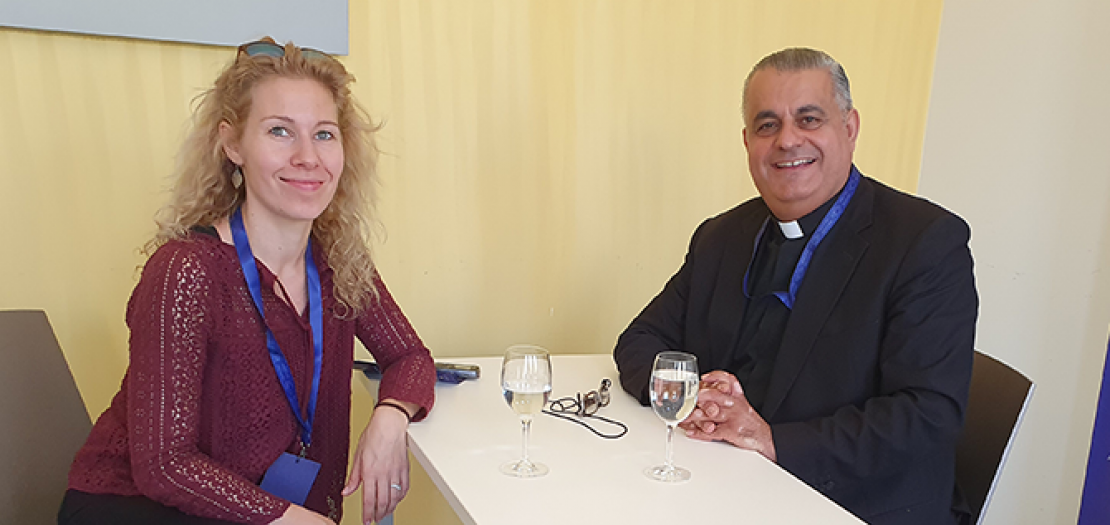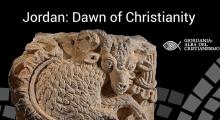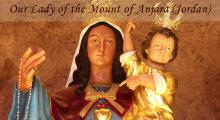Issued by the Catholic Center for Studies and Media - Jordan. Editor-in-chief Fr. Rif'at Bader - موقع أبونا abouna.org

Mass circulation Hungarian newspaper Magyar Nemzet, has interviewed Fr. Dr. Rif'at Bader, director of the Catholic Center for Studies and Media (CCSM) in Jordan, on the sidelines of the Budapest Forum for Christian Communicator, convening in Budapest September 4-6, 2019, in which he said that the religious harmony prevailing in Jordan is considered a global model for building unity and peace.
In the interview, Fr. Bader said, “The Jordanian leadership played a role in the success of this social cohesion. The wisdom of the Jordanian leadership treated all segments of the people equally. This is how His Majesty King Abdullah II runs the country as was the case with his father and grandfather. If one is denied freedom of worship, one will not find a way to serve the local community. Our case is the other way, for the freedom of worship enabled Christians to contribute to building the future of their country and society peacefully. Furthermore, Jordan has religious significance as Lord Jesus Christ was baptized in Jordan and several prophets crossed this land which became considered a holy land."
Although the Hungarian government uses the term "persecuted Christians" to refer to Christian of the Middle East, Fr. Bader pointed out that this term is inaccurate for the entire Christian groups since due to the wisdom of leaders of some countries, such as Jordan, Christians live in peace and security with all their rights preserved. Furthermore, there are no religious disputes in Jordan as Christians practise their religion freely. For example, Christmas is celebrated collectively in Jordan and is considered a national holiday. Christmas decorations can be seen in the streets of the Kingdom clearly and Christmas trees are installed in public squares. The encounter experienced in Jordan is very beautiful."
On the current role of Christians in Jordan, Fr. Bader said: "It is evident that despite the fact that the Christians represent a small group of Jordanian society, they contribute significantly to the Jordanian economy." He added that "Christianity has never been on the sidelines of Jordanian society. It has always been deeply rooted in the society serving as an integral part of it, providing spiritual services to Christian citizens in the first place, and open to the whole community through its educational mission provided by more than a 100 schools and universities, let alone its charity mission represented in helping the needy, the poor, and the refugees through its numerous social institutions, particularly Caritas Jordan."
After delivering his address on "Social Networking Sites and Youth," and its role in restoring confidence and hope in the youth, Fr. Bader said that this is well founded "through Islamic-Christian dialogue which began last century by holding annual conferences that support common living among the followers of religions. Furthermore, several conferences are being held in Jordan in addition to the numerous launched initiatives the most important of which is the Amman Message which was issued 15 years ago, or the World Interfaith Harmony Week that we established in the United Nations and was universally accepted. His Majesty King Abdullah received two awards in a period of six months from Washington and Rome owing to his efforts in support of harmony and religious common living as well as rejection of intolerance. The truth is that Jordan does not convey its message only to Hungary and Europe, but also to the entire world. Jordan is a concrete example of the success of religious harmony in the country."
On Jordan's hosting of hundreds of thousands of refugees, Fr. Bader explained that "one-third of Jordan's population is refugees as this does not apply to Palestinians, since they are part of Jordanian society. During the first Gulf War, many Iraqis came to Jordan as refugees. The year 2003, due to the so-called "setting the American democracy", Iraqi refugees came to Jordan. After al-Qaeda organization attacked the Christians of Iraq, many of them came to Jordan including the Christians of Mosul in addition the over a million refugees who sought refuge in Jordan following the Syrian crisis."
He continued that the wars in the Middle East have driven nearly two million Christians from their homes, pointing out that they became refugees and that they will not be able to return to their countries because of the fear instilled in their hearts and the difficulty of restoring their trust in their countries. Furthermore, he indicated that "terrorism has instilled fear in the hearts of people, not only in the Middle East but throughout the world," noting that we should not lose hope but continue to work for peace and restore joy to people even if policies fail.
Fr. Bader concluded the interview with the Hungarian newspaper by highlighting the importance of helping future generations to be happier and to maintain harmony. This is the most important question globally nowaday, since the problem is not merely terrorism, armies, or organizations. Whenever I see students celebrating their graduation, I think, can we guarantee work for them? But we have to knock on all doors and fight our fear. We must be wise and patient. We must redefine religion as a way of joy, not fear, and get people acquainted with God as a friend and a father. Today we need wise political and religious leaders. Even if politicians fail, we must have the capacity to work together, as Pope Francis said: "We must teach the generations to come the culture of meeting, the art of welcoming others, and the ability to work together for a better future."







